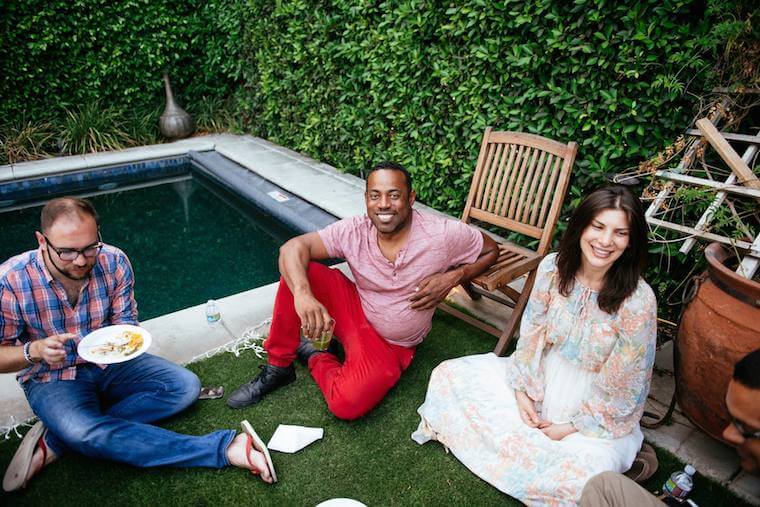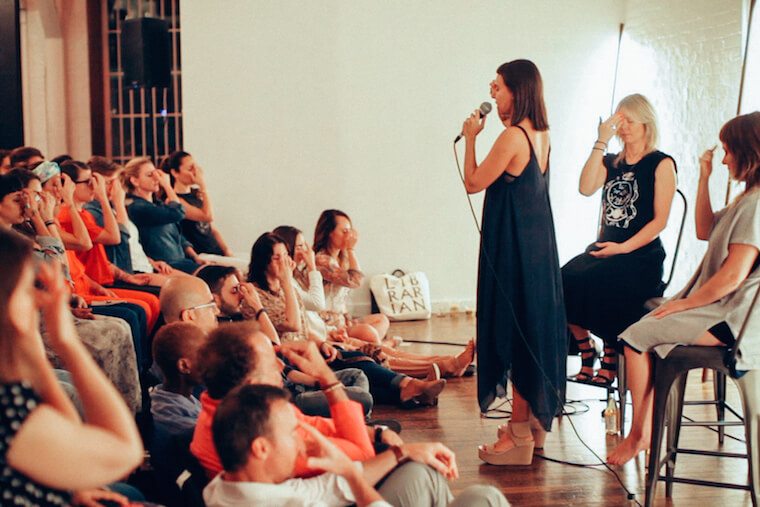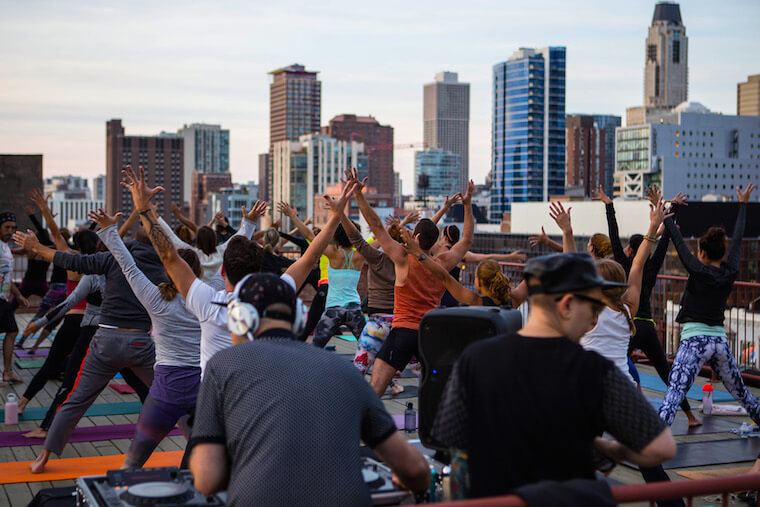Well+Good is your healthiest relationship, hooking you up with the best, most interesting things/people/leggings in wellness. And nothing gets at this concept better than the plus sign in our logo.
Inside this plus sign, which acts like a gallery window, we showcase the most exciting, transformative trends and ideas that add wellness to your life. This week on The Plus Factor, we’re focused on the social sober movement, where not drinking alcohol is what's buzzy.
Drinking wine, spirits, and the like has been at the center of social occasions since the Greeks and Romans. Even on today's healthy living scene, beer yoga, workouts-and-wine, and mindful cocktail nights foster engagement in what many love to call "healthy moderation."
But in a number of wellness circles, people are calling time on casual drinking, simply because it makes them feel like, well, crap. Or because the 12-step model of addiction isn't really a fit for these abstainers who are looking to lead a "high vibe life" without substances. Which is why a new crop of sober social events and venues have emerged in cities across the country and the pond.
For many people, cutting out alcohol is as natural a step in a healthy direction as nixing sugar.
In New York, the new Club Soda event series is billed as “a place for the sober-curious to explore how good life can get when we re-frame our relationship with alcohol.” In London, mocktail bar Redemption draws exceptionally glowy crowds for its beet “martinis” and coconut water “margaritas”—it's so popular, there are now two locations.

{{post.sponsorText}}
And in Los Angeles, Bender, Conscious Family Dinner, and The Shine Movement are creating a new social paradigm by combining elements like food, music, yoga, and self-improvement. (Although they take place after dark, the only alcohol you'll find is in the kombucha.)

When you have a space for living a healthy or "spiritually conscious, high vibe life," according to this line of thinking, no buzz-inducing substances are really necessary.
"We choose not to serve alcohol at the Conscious Family Dinner because we don't feel there is a need," explains Benjamin Rolnik of Integral Fitness, the organization behind the monthly supper club. "Instead, we lovingly work hard to create a magical environment for guests to feel welcome, safe, and empowered. Who needs alcohol when you're surrounded by the brightest conscious leaders in Los Angeles?" (He's got a point.)
Not drinking in social situations, when you've always had a drink in your hand, is really hard for many people.
According to Dawn Nickel, co-founder of addiction support network She Recovers, happenings like these act as havens for both those who are new to the dry life and those who have been sober for a while. "Not drinking in social situations, when you've always had a drink in your hand, is really hard for many people," she says.
Keep reading for more on why the wellness crowd is ditching alcohol, and where they're spending happy hour now.

When casual drinking loses its luster
Until recently, if you were interested in dialing back on social drinking in the name of wellness, there weren't a whole lot of places to get support. Sure, swapping your Chardonnay for iced tea may not sound like a big deal, but for many people it can invoke some serious anxiety.
“The most common concern that I see with my clients when they're ready to give up alcohol is the fear of a loss of connection,” says life mentor Jennifer Kass, who personally stopped drinking several years ago. After all, if your loved ones' social lives still revolve around alcohol, it's hard to be the odd one out with a water in hand, left to field their probing questions. (And it gets especially hard if your pals don't understand or agree with your choice.)
The Numinous creator Ruby Warrington had a bumpy transition of her own when she went dry for health reasons. “I had cut down a lot [on drinking], but since alcohol is woven through pretty much every social situation, I found it really difficult,” she says. Eventually, she enrolled in Alcoholics Anonymous, but found that it wasn’t quite what she was looking for. “I don’t identify with the label ‘alcoholic,’” says Warrington. “I also had many friends who felt the same way, and I figured there had to be a middle ground.”
From that place, she and meditation guide Biet Simkin created Club Soda. As Warrington puts it, it’s “a space to talk honestly about our conflicted relationship with booze—there's so much stigma about saying you no longer want to drink!” She says that the events draw a mix of teetotalers and those who are "questioning why they drink and struggling to align their current social life with drinking less."

The Club Soda nights are intentionally designed to have guests leaving on a "natural high," through a combination of meditation and conversation. (The most recent powwow focused on sober sex and dating—on December 1, the talk will turn to navigating the holidays without booze.)
The same can be said for events like Bender, which hosts dry yoga parties in Los Angeles and Chicago. "Between the yoga, the music, and the energy of like-minded people, everyone is sharing a powerful and engaging experience that makes them feel things," says founder (and DJ) Justin Henderson. "That experience itself gives them release and puts them in a different state of mind. They're already relaxed and connected after that—so drinking doesn't add anything."
Recovery steps into the spotlight
The realm of addiction and recovery is also evolving as public figures become more vocal about their past struggles and current sober reality.
"There's an emerging movement of literally scores of women and men showing the world that sober is the new cool," proclaims Nickel of She Recovers. "Media stories about celebrities living sober lifestyles, organizations like Faces and Voices of Recovery, and large scale events like the Concert to Face Addiction in DC last October—with performances by Steven Tyler and Sheryl Crowe, to name just a few—have definitely helped change people’s minds."
One of those new sober role models is NYC-based yoga and meditation instructor Elena Brower, who's part of a spiritually-inclined subset that includes Tommy Rosen, Gabrielle Bernstein, and Home podcasters Holly Whitaker and Laura McKowen. “Since I've publicly ended my own story with addiction, I've had dozens of friends and students, especially in the healing community, reach out to me to receive support, encouragement, or guidance,” Brower says. “It seems there is a true recalibration happening, particularly in the wellness community.”
Brower collaborates closely with She Recovers—she'll be speaking at the organization's first ever conference next spring, and will be leading a Yoga for Recovery class with She Recovers co-founder Taryn Strong on October 8. The group's mission is to show women that there are different pathways to recovery beyond 12-step programs (which are life-saving for many but, Nickel says, don't work for everyone). Social events, including retreats, workshops, and the upcoming conference, are a key ingredient in the mix.
"Events like She Recovers in NYC can provide the opportunity to have fun, connect and be inspired... they provide a safe, non-judgmental space for women to explore their own relationships with addiction and other life challenges," says Nickel. "But in the end, we also want to show the world what recovery and sobriety look like. Between our online community and our real-life efforts, I think we're making a difference."
For many, the experience of sober social clubs and gatherings gives them a new outlook on alcohol; for others, it may lead to a realization that they'd like to try going without. And if that's the case, says Warrington, there's nothing to fear—and plenty to look forward to.
“In my own experience [with giving up alcohol], I’ve found way more clarity, calmness, and confidence in every area of life; increased commitment to personal, wellness, and professional goals; better relationships....” And those aren’t even the best parts, she says. “Honestly, the simple fact that I never wake up hungover is utter, utter bliss.”
One of the toughest parts about going alcohol-free: navigating the dating scene. Here, Biet Simkin from Club Soda gives some tips on flirting while sober (minus the awkwardness). And if you're looking for something new and healthy to sip on, how about these trendy drinking vinegars?
Loading More Posts...